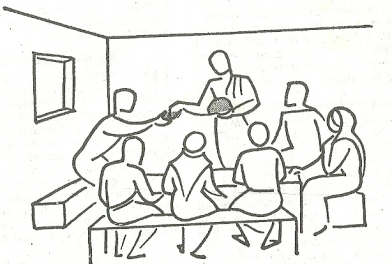the mutual meeting
10-04-2014 - Posted by Andre Piet In the previous blog about Heb.10:25, it was about ” the mutual meetings of believers.” and the habit of some people to forsake it. What remained is that the writer used a special word for such “mutual meetings”. In Greek, the word epi-sunagoge is used (see also: 2Thes.2:1). It is derived from the verb (epi-sunago), which means “gather together”‘ (e.g. Mat.23:37). Without the prefix epi (=on), the word sunagoge occurs 56 x in the NT and can consistently be rendered as synagogue. Some hesitate to use it in James 2:2, because they have difficulty with James addressing his letter “to the twelve tribes” (James 1:1). The writer of the Hebrew letter, in 10:25, is not referring to the synagogue, but to the epi-sunagoge. That difference is not without significance. The letter is addressed to Hebrews, who had the custom to meet each other in the synagogue and in the temple. In chapter 10, the author reminds them of an upcoming judgment (“The Lord shall judge his people”; 10:30). That would be a straightforward drama (“a fearful looking for of judgment and fiery indignation”; 10:27). The writer is referring to the burning and the destruction of Jerusalem and the temple, in the year 70 AD. Many of the Jesus-as-Messiah-professing Jews were in danger of succumbing to the pressure from their fellow Jews to renounce Jesus (10:29; 6:4-8). The believing Hebrews are called to leave “the camp”, i.e. the religious Jerusalem, which had crucified Jesus (13:13). The faithful Hebrews did meet together, but outside the established system; not (any longer) in the synagogues, but in their “mutual meetings”. Hence, epi-sunagoge.
In the previous blog about Heb.10:25, it was about ” the mutual meetings of believers.” and the habit of some people to forsake it. What remained is that the writer used a special word for such “mutual meetings”. In Greek, the word epi-sunagoge is used (see also: 2Thes.2:1). It is derived from the verb (epi-sunago), which means “gather together”‘ (e.g. Mat.23:37). Without the prefix epi (=on), the word sunagoge occurs 56 x in the NT and can consistently be rendered as synagogue. Some hesitate to use it in James 2:2, because they have difficulty with James addressing his letter “to the twelve tribes” (James 1:1). The writer of the Hebrew letter, in 10:25, is not referring to the synagogue, but to the epi-sunagoge. That difference is not without significance. The letter is addressed to Hebrews, who had the custom to meet each other in the synagogue and in the temple. In chapter 10, the author reminds them of an upcoming judgment (“The Lord shall judge his people”; 10:30). That would be a straightforward drama (“a fearful looking for of judgment and fiery indignation”; 10:27). The writer is referring to the burning and the destruction of Jerusalem and the temple, in the year 70 AD. Many of the Jesus-as-Messiah-professing Jews were in danger of succumbing to the pressure from their fellow Jews to renounce Jesus (10:29; 6:4-8). The believing Hebrews are called to leave “the camp”, i.e. the religious Jerusalem, which had crucified Jesus (13:13). The faithful Hebrews did meet together, but outside the established system; not (any longer) in the synagogues, but in their “mutual meetings”. Hence, epi-sunagoge.
13 Now then, we may be coming out to Him outside the camp, carrying His reproach. (…) 15 Through Him, then, we may be offering up the sacrifice of praise to God continually, that is, the fruit of lips avowing His name. -Hebrews 13:13,15-

 English Blog
English Blog